Annotated Bibliography: SEN, Child Development, and Education
VerifiedAdded on 2021/11/16
|6
|1405
|85
Annotated Bibliography
AI Summary
This annotated bibliography presents summaries and critical analyses of two key sources: Mackenzie's (2012) article on teacher resilience in special education and Dowling's (2014) book chapter on young children's personal, social, and emotional development. Mackenzie's work explores factors that influence teachers' commitment to working with children with Special Educational Needs (SEN), emphasizing the importance of administrative support, school leadership, and professional development. Dowling's chapter delves into the philosophical perspectives on child behavior, examining how children develop acceptable behaviors and how parenting styles influence their development. The annotations highlight the strengths and weaknesses of each source, providing insights into the research methodologies, key findings, and implications for understanding child development and educational practices.
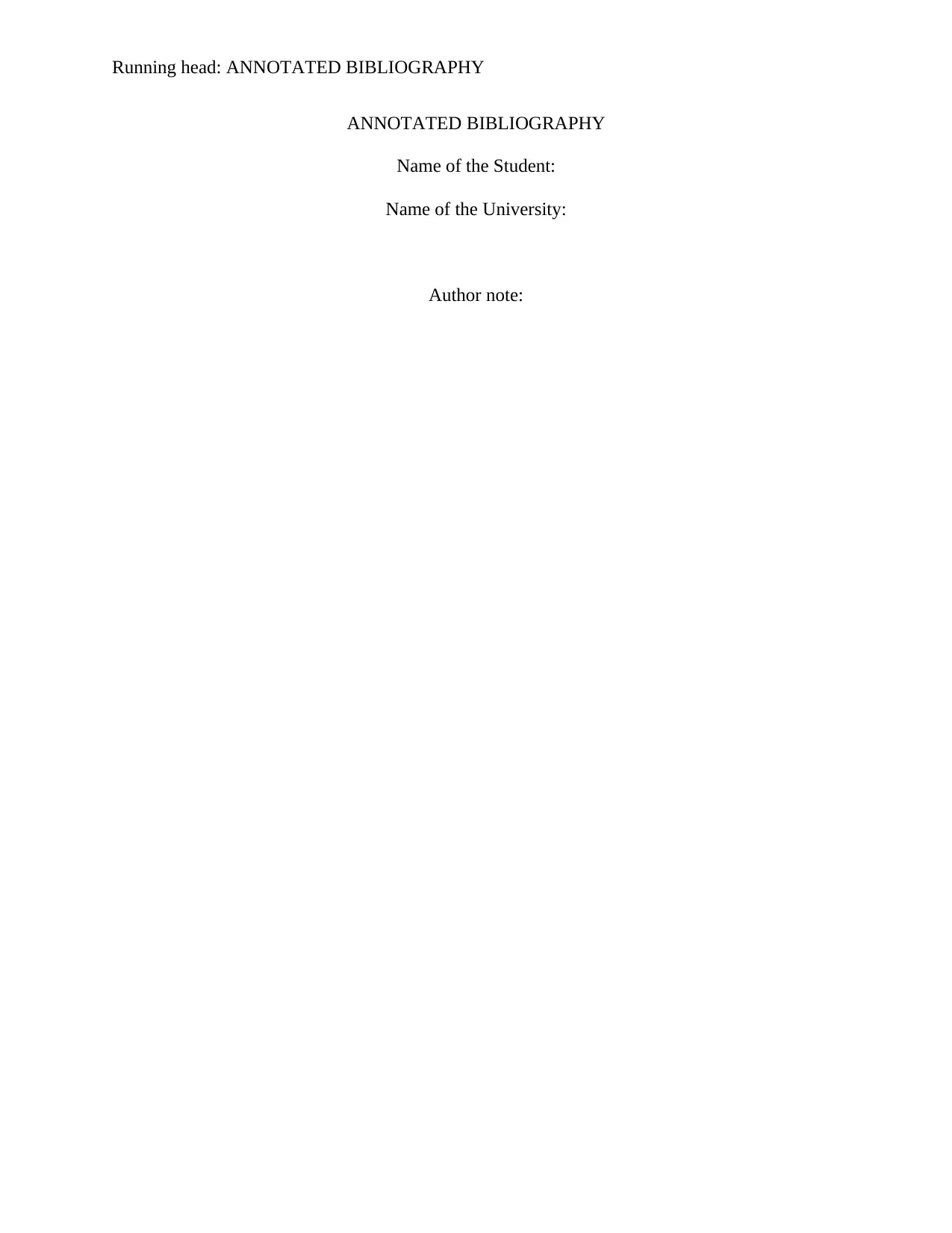
Running head: ANNOTATED BIBLIOGRAPHY
ANNOTATED BIBLIOGRAPHY
Name of the Student:
Name of the University:
Author note:
ANNOTATED BIBLIOGRAPHY
Name of the Student:
Name of the University:
Author note:
Paraphrase This Document
Need a fresh take? Get an instant paraphrase of this document with our AI Paraphraser
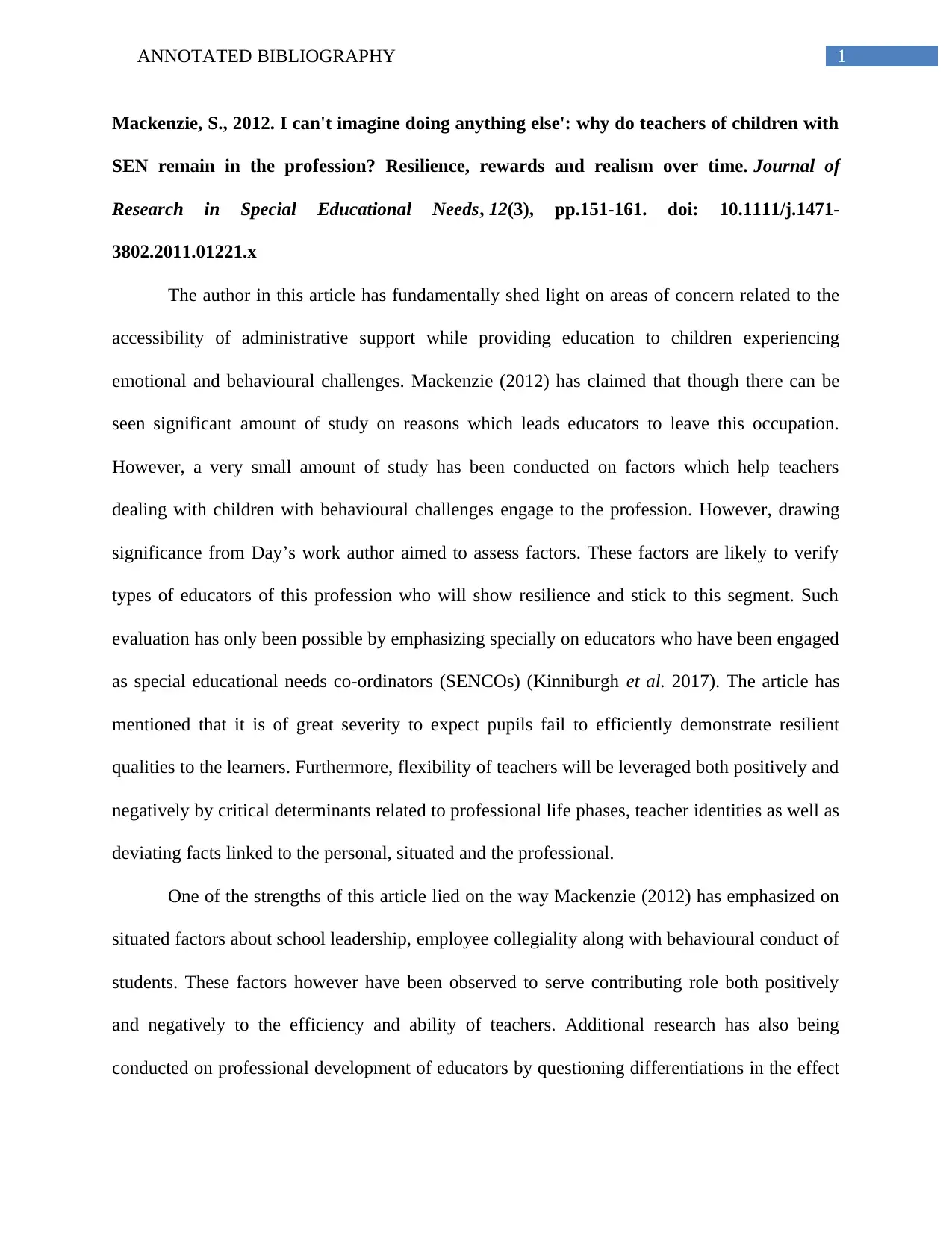
1ANNOTATED BIBLIOGRAPHY
Mackenzie, S., 2012. I can't imagine doing anything else': why do teachers of children with
SEN remain in the profession? Resilience, rewards and realism over time. Journal of
Research in Special Educational Needs, 12(3), pp.151-161. doi: 10.1111/j.1471-
3802.2011.01221.x
The author in this article has fundamentally shed light on areas of concern related to the
accessibility of administrative support while providing education to children experiencing
emotional and behavioural challenges. Mackenzie (2012) has claimed that though there can be
seen significant amount of study on reasons which leads educators to leave this occupation.
However, a very small amount of study has been conducted on factors which help teachers
dealing with children with behavioural challenges engage to the profession. However, drawing
significance from Day’s work author aimed to assess factors. These factors are likely to verify
types of educators of this profession who will show resilience and stick to this segment. Such
evaluation has only been possible by emphasizing specially on educators who have been engaged
as special educational needs co-ordinators (SENCOs) (Kinniburgh et al. 2017). The article has
mentioned that it is of great severity to expect pupils fail to efficiently demonstrate resilient
qualities to the learners. Furthermore, flexibility of teachers will be leveraged both positively and
negatively by critical determinants related to professional life phases, teacher identities as well as
deviating facts linked to the personal, situated and the professional.
One of the strengths of this article lied on the way Mackenzie (2012) has emphasized on
situated factors about school leadership, employee collegiality along with behavioural conduct of
students. These factors however have been observed to serve contributing role both positively
and negatively to the efficiency and ability of teachers. Additional research has also being
conducted on professional development of educators by questioning differentiations in the effect
Mackenzie, S., 2012. I can't imagine doing anything else': why do teachers of children with
SEN remain in the profession? Resilience, rewards and realism over time. Journal of
Research in Special Educational Needs, 12(3), pp.151-161. doi: 10.1111/j.1471-
3802.2011.01221.x
The author in this article has fundamentally shed light on areas of concern related to the
accessibility of administrative support while providing education to children experiencing
emotional and behavioural challenges. Mackenzie (2012) has claimed that though there can be
seen significant amount of study on reasons which leads educators to leave this occupation.
However, a very small amount of study has been conducted on factors which help teachers
dealing with children with behavioural challenges engage to the profession. However, drawing
significance from Day’s work author aimed to assess factors. These factors are likely to verify
types of educators of this profession who will show resilience and stick to this segment. Such
evaluation has only been possible by emphasizing specially on educators who have been engaged
as special educational needs co-ordinators (SENCOs) (Kinniburgh et al. 2017). The article has
mentioned that it is of great severity to expect pupils fail to efficiently demonstrate resilient
qualities to the learners. Furthermore, flexibility of teachers will be leveraged both positively and
negatively by critical determinants related to professional life phases, teacher identities as well as
deviating facts linked to the personal, situated and the professional.
One of the strengths of this article lied on the way Mackenzie (2012) has emphasized on
situated factors about school leadership, employee collegiality along with behavioural conduct of
students. These factors however have been observed to serve contributing role both positively
and negatively to the efficiency and ability of teachers. Additional research has also being
conducted on professional development of educators by questioning differentiations in the effect
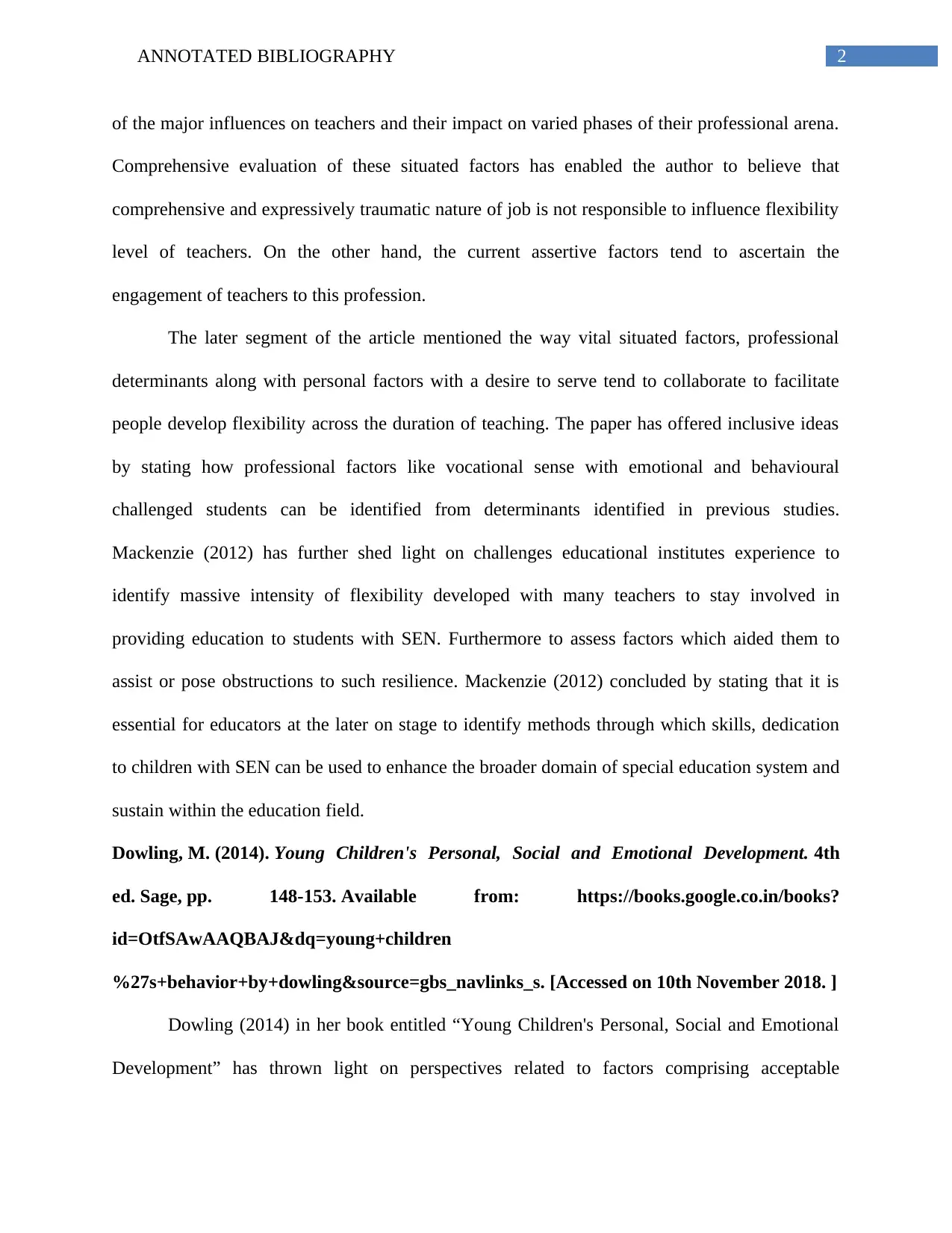
2ANNOTATED BIBLIOGRAPHY
of the major influences on teachers and their impact on varied phases of their professional arena.
Comprehensive evaluation of these situated factors has enabled the author to believe that
comprehensive and expressively traumatic nature of job is not responsible to influence flexibility
level of teachers. On the other hand, the current assertive factors tend to ascertain the
engagement of teachers to this profession.
The later segment of the article mentioned the way vital situated factors, professional
determinants along with personal factors with a desire to serve tend to collaborate to facilitate
people develop flexibility across the duration of teaching. The paper has offered inclusive ideas
by stating how professional factors like vocational sense with emotional and behavioural
challenged students can be identified from determinants identified in previous studies.
Mackenzie (2012) has further shed light on challenges educational institutes experience to
identify massive intensity of flexibility developed with many teachers to stay involved in
providing education to students with SEN. Furthermore to assess factors which aided them to
assist or pose obstructions to such resilience. Mackenzie (2012) concluded by stating that it is
essential for educators at the later on stage to identify methods through which skills, dedication
to children with SEN can be used to enhance the broader domain of special education system and
sustain within the education field.
Dowling, M. (2014). Young Children's Personal, Social and Emotional Development. 4th
ed. Sage, pp. 148-153. Available from: https://books.google.co.in/books?
id=OtfSAwAAQBAJ&dq=young+children
%27s+behavior+by+dowling&source=gbs_navlinks_s. [Accessed on 10th November 2018. ]
Dowling (2014) in her book entitled “Young Children's Personal, Social and Emotional
Development” has thrown light on perspectives related to factors comprising acceptable
of the major influences on teachers and their impact on varied phases of their professional arena.
Comprehensive evaluation of these situated factors has enabled the author to believe that
comprehensive and expressively traumatic nature of job is not responsible to influence flexibility
level of teachers. On the other hand, the current assertive factors tend to ascertain the
engagement of teachers to this profession.
The later segment of the article mentioned the way vital situated factors, professional
determinants along with personal factors with a desire to serve tend to collaborate to facilitate
people develop flexibility across the duration of teaching. The paper has offered inclusive ideas
by stating how professional factors like vocational sense with emotional and behavioural
challenged students can be identified from determinants identified in previous studies.
Mackenzie (2012) has further shed light on challenges educational institutes experience to
identify massive intensity of flexibility developed with many teachers to stay involved in
providing education to students with SEN. Furthermore to assess factors which aided them to
assist or pose obstructions to such resilience. Mackenzie (2012) concluded by stating that it is
essential for educators at the later on stage to identify methods through which skills, dedication
to children with SEN can be used to enhance the broader domain of special education system and
sustain within the education field.
Dowling, M. (2014). Young Children's Personal, Social and Emotional Development. 4th
ed. Sage, pp. 148-153. Available from: https://books.google.co.in/books?
id=OtfSAwAAQBAJ&dq=young+children
%27s+behavior+by+dowling&source=gbs_navlinks_s. [Accessed on 10th November 2018. ]
Dowling (2014) in her book entitled “Young Children's Personal, Social and Emotional
Development” has thrown light on perspectives related to factors comprising acceptable
⊘ This is a preview!⊘
Do you want full access?
Subscribe today to unlock all pages.

Trusted by 1+ million students worldwide
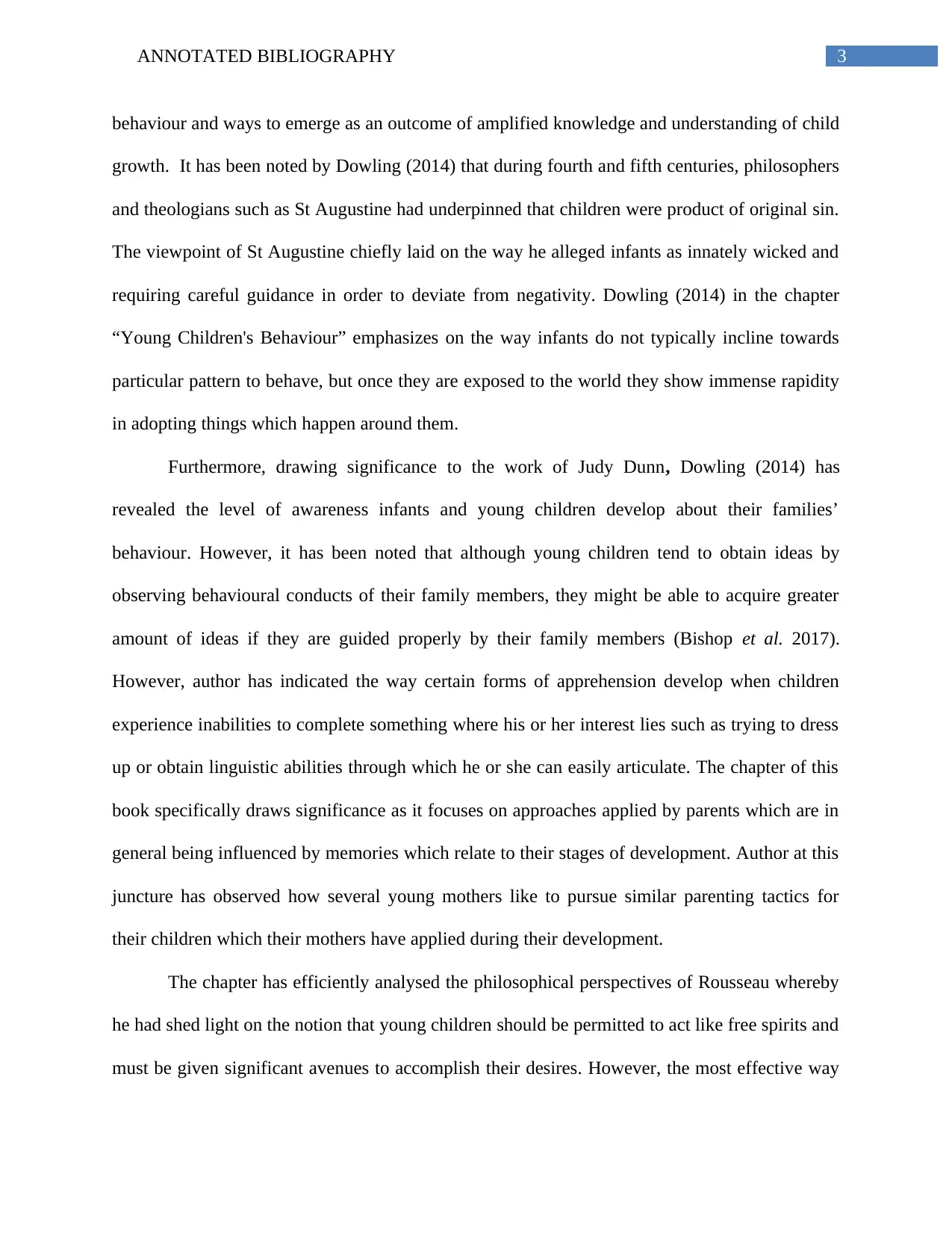
3ANNOTATED BIBLIOGRAPHY
behaviour and ways to emerge as an outcome of amplified knowledge and understanding of child
growth. It has been noted by Dowling (2014) that during fourth and fifth centuries, philosophers
and theologians such as St Augustine had underpinned that children were product of original sin.
The viewpoint of St Augustine chiefly laid on the way he alleged infants as innately wicked and
requiring careful guidance in order to deviate from negativity. Dowling (2014) in the chapter
“Young Children's Behaviour” emphasizes on the way infants do not typically incline towards
particular pattern to behave, but once they are exposed to the world they show immense rapidity
in adopting things which happen around them.
Furthermore, drawing significance to the work of Judy Dunn, Dowling (2014) has
revealed the level of awareness infants and young children develop about their families’
behaviour. However, it has been noted that although young children tend to obtain ideas by
observing behavioural conducts of their family members, they might be able to acquire greater
amount of ideas if they are guided properly by their family members (Bishop et al. 2017).
However, author has indicated the way certain forms of apprehension develop when children
experience inabilities to complete something where his or her interest lies such as trying to dress
up or obtain linguistic abilities through which he or she can easily articulate. The chapter of this
book specifically draws significance as it focuses on approaches applied by parents which are in
general being influenced by memories which relate to their stages of development. Author at this
juncture has observed how several young mothers like to pursue similar parenting tactics for
their children which their mothers have applied during their development.
The chapter has efficiently analysed the philosophical perspectives of Rousseau whereby
he had shed light on the notion that young children should be permitted to act like free spirits and
must be given significant avenues to accomplish their desires. However, the most effective way
behaviour and ways to emerge as an outcome of amplified knowledge and understanding of child
growth. It has been noted by Dowling (2014) that during fourth and fifth centuries, philosophers
and theologians such as St Augustine had underpinned that children were product of original sin.
The viewpoint of St Augustine chiefly laid on the way he alleged infants as innately wicked and
requiring careful guidance in order to deviate from negativity. Dowling (2014) in the chapter
“Young Children's Behaviour” emphasizes on the way infants do not typically incline towards
particular pattern to behave, but once they are exposed to the world they show immense rapidity
in adopting things which happen around them.
Furthermore, drawing significance to the work of Judy Dunn, Dowling (2014) has
revealed the level of awareness infants and young children develop about their families’
behaviour. However, it has been noted that although young children tend to obtain ideas by
observing behavioural conducts of their family members, they might be able to acquire greater
amount of ideas if they are guided properly by their family members (Bishop et al. 2017).
However, author has indicated the way certain forms of apprehension develop when children
experience inabilities to complete something where his or her interest lies such as trying to dress
up or obtain linguistic abilities through which he or she can easily articulate. The chapter of this
book specifically draws significance as it focuses on approaches applied by parents which are in
general being influenced by memories which relate to their stages of development. Author at this
juncture has observed how several young mothers like to pursue similar parenting tactics for
their children which their mothers have applied during their development.
The chapter has efficiently analysed the philosophical perspectives of Rousseau whereby
he had shed light on the notion that young children should be permitted to act like free spirits and
must be given significant avenues to accomplish their desires. However, the most effective way
Paraphrase This Document
Need a fresh take? Get an instant paraphrase of this document with our AI Paraphraser
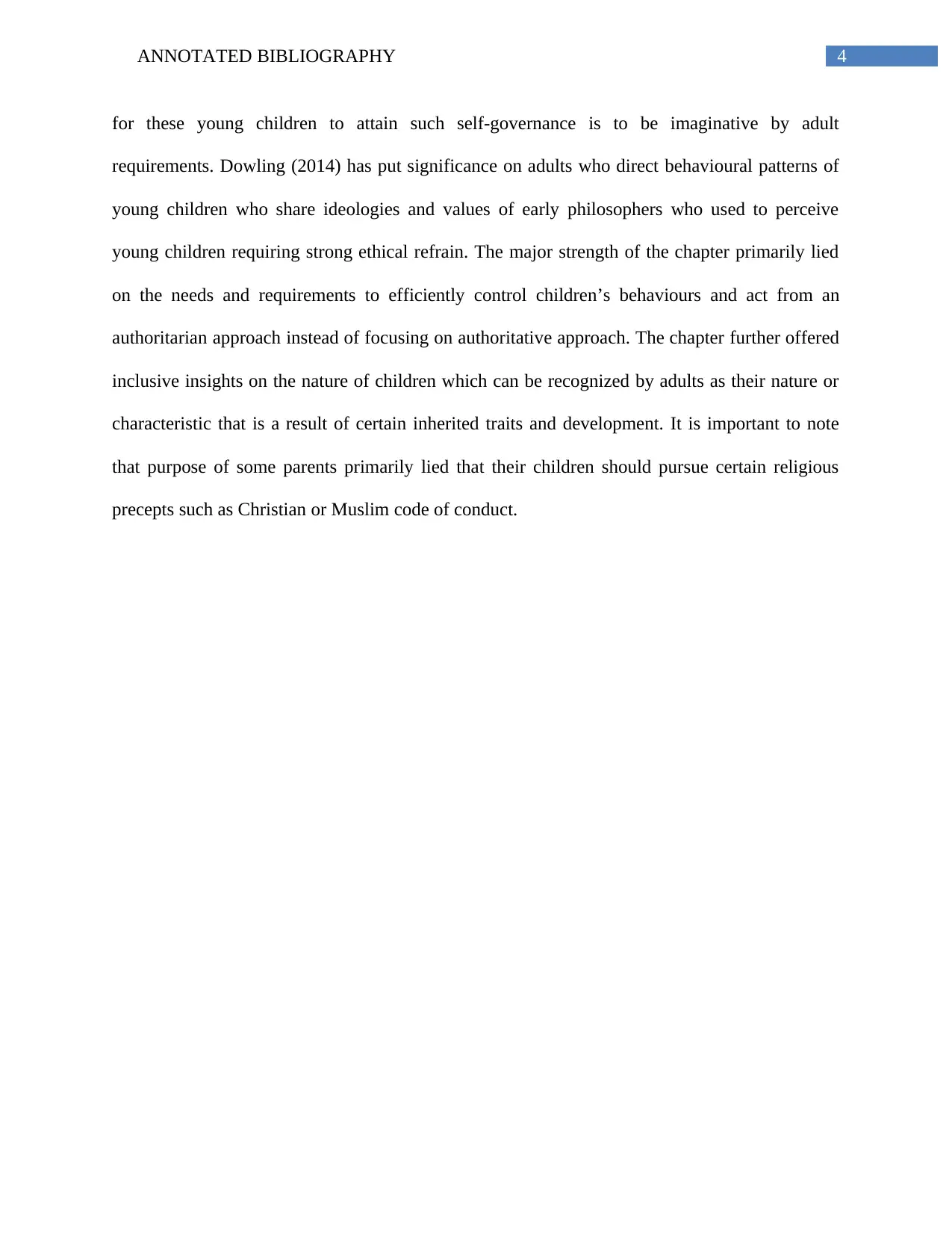
4ANNOTATED BIBLIOGRAPHY
for these young children to attain such self-governance is to be imaginative by adult
requirements. Dowling (2014) has put significance on adults who direct behavioural patterns of
young children who share ideologies and values of early philosophers who used to perceive
young children requiring strong ethical refrain. The major strength of the chapter primarily lied
on the needs and requirements to efficiently control children’s behaviours and act from an
authoritarian approach instead of focusing on authoritative approach. The chapter further offered
inclusive insights on the nature of children which can be recognized by adults as their nature or
characteristic that is a result of certain inherited traits and development. It is important to note
that purpose of some parents primarily lied that their children should pursue certain religious
precepts such as Christian or Muslim code of conduct.
for these young children to attain such self-governance is to be imaginative by adult
requirements. Dowling (2014) has put significance on adults who direct behavioural patterns of
young children who share ideologies and values of early philosophers who used to perceive
young children requiring strong ethical refrain. The major strength of the chapter primarily lied
on the needs and requirements to efficiently control children’s behaviours and act from an
authoritarian approach instead of focusing on authoritative approach. The chapter further offered
inclusive insights on the nature of children which can be recognized by adults as their nature or
characteristic that is a result of certain inherited traits and development. It is important to note
that purpose of some parents primarily lied that their children should pursue certain religious
precepts such as Christian or Muslim code of conduct.
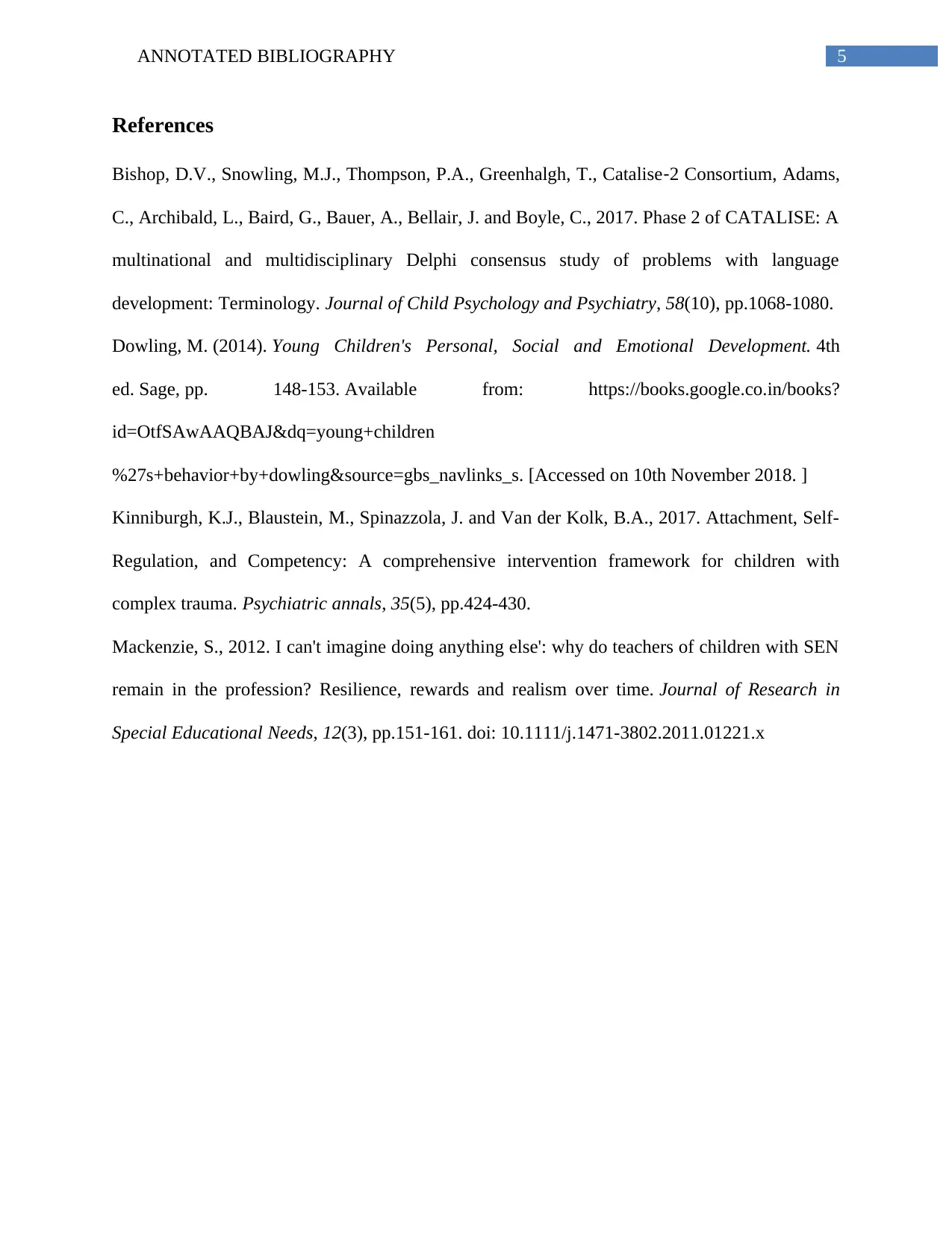
5ANNOTATED BIBLIOGRAPHY
References
Bishop, D.V., Snowling, M.J., Thompson, P.A., Greenhalgh, T., Catalise‐2 Consortium, Adams,
C., Archibald, L., Baird, G., Bauer, A., Bellair, J. and Boyle, C., 2017. Phase 2 of CATALISE: A
multinational and multidisciplinary Delphi consensus study of problems with language
development: Terminology. Journal of Child Psychology and Psychiatry, 58(10), pp.1068-1080.
Dowling, M. (2014). Young Children's Personal, Social and Emotional Development. 4th
ed. Sage, pp. 148-153. Available from: https://books.google.co.in/books?
id=OtfSAwAAQBAJ&dq=young+children
%27s+behavior+by+dowling&source=gbs_navlinks_s. [Accessed on 10th November 2018. ]
Kinniburgh, K.J., Blaustein, M., Spinazzola, J. and Van der Kolk, B.A., 2017. Attachment, Self-
Regulation, and Competency: A comprehensive intervention framework for children with
complex trauma. Psychiatric annals, 35(5), pp.424-430.
Mackenzie, S., 2012. I can't imagine doing anything else': why do teachers of children with SEN
remain in the profession? Resilience, rewards and realism over time. Journal of Research in
Special Educational Needs, 12(3), pp.151-161. doi: 10.1111/j.1471-3802.2011.01221.x
References
Bishop, D.V., Snowling, M.J., Thompson, P.A., Greenhalgh, T., Catalise‐2 Consortium, Adams,
C., Archibald, L., Baird, G., Bauer, A., Bellair, J. and Boyle, C., 2017. Phase 2 of CATALISE: A
multinational and multidisciplinary Delphi consensus study of problems with language
development: Terminology. Journal of Child Psychology and Psychiatry, 58(10), pp.1068-1080.
Dowling, M. (2014). Young Children's Personal, Social and Emotional Development. 4th
ed. Sage, pp. 148-153. Available from: https://books.google.co.in/books?
id=OtfSAwAAQBAJ&dq=young+children
%27s+behavior+by+dowling&source=gbs_navlinks_s. [Accessed on 10th November 2018. ]
Kinniburgh, K.J., Blaustein, M., Spinazzola, J. and Van der Kolk, B.A., 2017. Attachment, Self-
Regulation, and Competency: A comprehensive intervention framework for children with
complex trauma. Psychiatric annals, 35(5), pp.424-430.
Mackenzie, S., 2012. I can't imagine doing anything else': why do teachers of children with SEN
remain in the profession? Resilience, rewards and realism over time. Journal of Research in
Special Educational Needs, 12(3), pp.151-161. doi: 10.1111/j.1471-3802.2011.01221.x
⊘ This is a preview!⊘
Do you want full access?
Subscribe today to unlock all pages.

Trusted by 1+ million students worldwide
1 out of 6
Your All-in-One AI-Powered Toolkit for Academic Success.
+13062052269
info@desklib.com
Available 24*7 on WhatsApp / Email
![[object Object]](/_next/static/media/star-bottom.7253800d.svg)
Unlock your academic potential
Copyright © 2020–2026 A2Z Services. All Rights Reserved. Developed and managed by ZUCOL.


